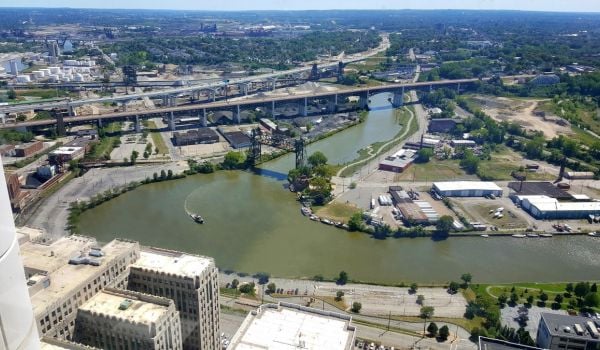Last year, after Ohio became the latest state to legalize casino gambling, its first gaming complex opened in downtown Cleveland. Casinos in Toledo and Columbus appeared soon thereafter, and another is slated for Cincinnati. In Forefront this week, writer Anna Clark examines the industry, from these Ohio upstarts to longtime gambling haven Atlantic City, to find out casinos belong in urban downtowns.
It used to be that casinos made a destination out of a rare few cities: Las Vegas, Atlantic City, Reno. That is changing as states and cities grow hungry for new sources of revenue to plug budget holes. Ten years ago, 11 states allowed commercial gaming in land-based, riverboat or racetrack casinos. Now, 24 do. (A dozen additional states host Native American casinos.)
As states approve gaming, it’s often the large and mid-size cities that hurry to make casinos feel at home. Pennsylvania, for instance, has 10 casinos, with three concentrated in the Philadelphia region; the city itself is the only locality with approval for a second facility. All three non-Indian casinos in Michigan are in Detroit, two of them practically within a baseball’s throw from each other. There’s enough activity in the Detroit casinos to make it the fourth largest casino market in the country, generating $1.4 billion in revenue.
The casino where I met Joe is Ohio’s first full-service gaming facility. Others opened in Toledo and Columbus soon thereafter, and in March another Horseshoe Casino in Cincinnati will welcome its first guests. By opening casinos in four major cities, the hope in Ohio goes beyond the sparkling lights, lavish buffets and even the potential for tax revenue: As investments that rival only stadiums in scope, these casinos are tasked with bringing life to urban economies. From foot traffic to spinoff businesses, from jobs at craps tables to construction work, more and more communities are betting on casinos to fill the void in city centers. The new entertainment option is also expected to entice people to neighborhoods they don’t otherwise visit, and could go a long way toward assuring newcomers, like Joe’s wife, that the city isn’t as frightening as they believed.
It took four failed ballot measures before the initiative that legalized gaming in Ohio passed in 2009. The constitutional amendment approved by voters details how casinos will be taxed — 33 percent of gross revenues. Comparatively, Maryland casinos will be taxed at just below 50 percent, down from 67 percent (a nationwide high) after a November ballot initiative. Casinos also pay for licenses and one-time fees.
For many voters, support hinged on the notion that gaming would significantly boost local economies and public services.
“We think the reason we were successful [this time] was because we had a different approach to stimulating community development,” said Jennifer Kulczycki, communications director for Rock Gaming, which, in a joint venture with Caesars Entertainment, co-owns the Cleveland and forthcoming Cincinnati casinos. “This wasn’t just one casino in the state sitting out in a cornfield near a highway off-ramp… but one in each of the state’s largest cities, employing local companies and workers as much as possible.”
In addition to their economic impact, casinos are sold as appealing additions to the urban landscape. Cincinnati’s $400 million, 23-acre casino includes a one-acre outdoor plaza in front of the main entrance intended for festivals and special events, as well as to buffer the casino from its neighbors. While the Cincinnati casino is off Interstate 71, and a little set off from the city center, Kulczycki said that “the orientation is very directed at downtown.” She sees the entryway into the new casino as an important space: It needs to be welcoming and “act as the link between the casino and the community.”
But the promise of urban casinos carries no small risk — and not just for individuals who stand to lose on the betting floor or fall prey to addictive gambling. Indeed, the actual return on investment for cities is uncertain.
To read more, subscribe to Forefront. Already a subscriber? Click here to continue reading.
















